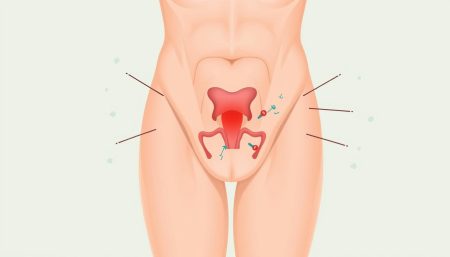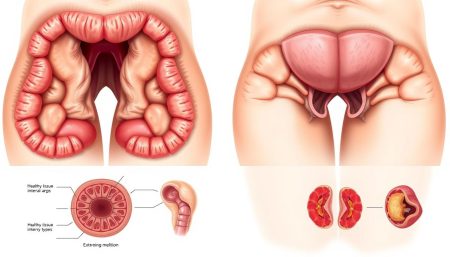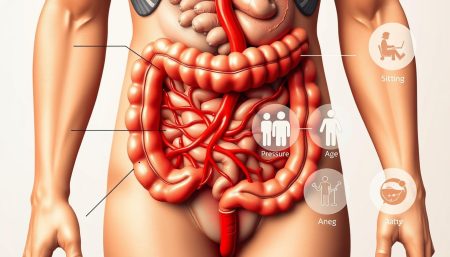Understanding the signs of hemorrhoids is important, even if it’s not a topic we like to talk about. Hemorrhoids are swollen veins in the rectum or anus. They cause different hemorrhoid symptomatic experiences for everyone. This article will help you understand what hemorrhoids feel like and why it’s key to notice symptoms early.
Key Takeaways
- Spotting the early signs of hemorrhoids is crucial for treatment.
- Symptoms often include discomfort, pain, and itching.
- Each person’s experience with hemorrhoids is unique, yet some symptoms are common.
- Knowing your symptoms can help you take better care of yourself.
- Managing symptoms early can prevent more serious problems.
- If symptoms don’t go away, it’s best to see a doctor.
Understanding Hemorrhoids and Their Causes
To understand what do hemorrhoids feel like, we need to know about them first. Hemorrhoids, or piles, are swollen veins in the anus and rectum. hemorrhoid causes include straining, constipation, and sitting for long times.
Being pregnant or overweight can also cause them. This section will explain the main reasons for hemorrhoids. It will answer the question: what do hemorrhoids feel like? Here are the main causes:
- Straining during bowel movements
- Prolonged sitting, especially on hard surfaces
- Poor dietary choices leading to constipation or irregular bowels
- Excessive lifting of heavy objects
- Pregnancy, affecting the pressure on pelvic veins
Knowing hemorrhoid causes is key to preventing and managing symptoms.
Table of Risk Factors Linked to Hemorrhoids
| Risk Factor | Description | Preventive Measures |
|---|---|---|
| Constipation | Frequent straining to pass stools | High fiber diet, increased water intake |
| Prolonged Sitting | Extended periods of no movement, increasing pressure on pelvic veins | Regular breaks and stretches |
| Heavy Lifting | Putting excess strain on the body | Proper lifting techniques, avoiding overexertion |
| Pregnancy | Increase in pelvic pressure due to the growing fetus | Appropriate posture, prenatal exercises |
Knowing hemorrhoid causes helps us avoid them. It also tells us what do hemorrhoids feel like when they occur.
Identifying the Hemorrhoid Symptoms
Knowing the difference between internal and external hemorrhoids is key to managing them. Each type has its own signs and symptoms. This section will help you understand what to look for, improving your awareness of hemorrhoid symptoms and sensations.
External vs. Internal Hemorrhoids
External hemorrhoids form under the skin around the anus. They are easier to spot because of their location. But, they can hurt more because the area is sensitive.
Internal hemorrhoids, on the other hand, are less noticeable since they form inside the rectum. They might not hurt as much but can still cause discomfort. This can lead to bleeding or the hemorrhoid bulging out of the anus.
Common Symptoms of Hemorrhoids
Both external and internal hemorrhoids share some common symptoms. These include:
- Itching and discomfort in the anal region
- Pain and swelling around the anus
- Bleeding during or after bowel movements without associated pain (often noticed as marks on toilet paper)
- A palpable lump near the anus, which may be sensitive or painful
- Mucus discharge after passing a stool
Watching for these symptoms is crucial. A strong sensation, like throbbing or stabbing pain, means the hemorrhoids might be thrombosed or prolapsed. These cases need immediate medical care.
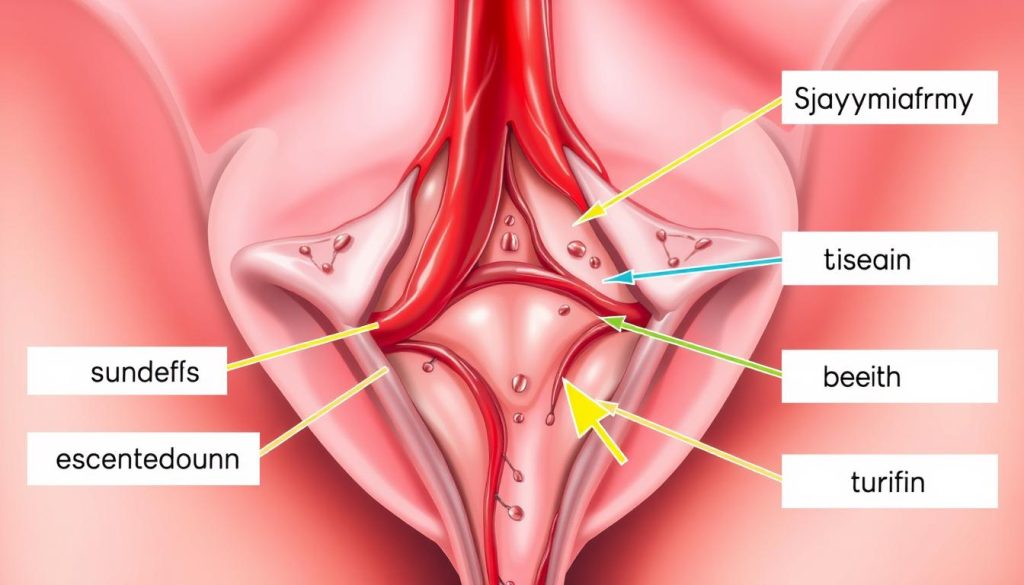
What Do Hemorrhoids Feel Like
It’s important to know what hemorrhoids feel like to know when to see a doctor. The symptoms can vary, but common ones include discomfort, itching, and feeling something in the rectal area.
People with hemorrhoids often feel a burning sensation or a throbbing pain. This pain can get worse when you’re on the toilet or sitting for a long time.
Home remedies or over-the-counter treatments can help ease these symptoms. But, if the pain doesn’t go away, you might need to see a doctor. For more information, check out hormonal changes affecting bodily functions. It talks about how these changes can also affect hemorrhoids.
Some people feel like they need to have a bowel movement, even when they don’t. This feeling of ‘fullness’ or pressure is part of the experience. It’s different for everyone but usually involves discomfort in the anal area.
The feelings can range from mild itching to severe pain. How much pain you feel can help you understand your condition better. Spotting these symptoms early can help manage them before they get worse.
Taking care of these symptoms is key to feeling better. It’s not just about fixing the pain right now. It’s also about preventing future problems and keeping your health in check.
The Pain Spectrum: Hemorrhoid Pain Level
Knowing the hemorrhoid pain level is key for those with symptoms. It helps decide when to see a doctor. The pain can range from mild to severe, affecting daily life and quality of life.
Evaluating Hemorrhoid Pain Intensity
To measure hemorrhoid pain, note how often and how bad the pain is. What do hemorrhoids feel like can change a lot. It can be a small bother or very painful, making it hard to do everyday things. Knowing this helps choose the right treatment.
| Pain Level | Description | Typical Symptoms |
|---|---|---|
| Mild | Intermittent discomfort | Occasional itching or throbbing |
| Moderate | Constant irritation | Frequent itching, discomfort with bowel movements |
| Severe | Debilitating pain | Sharp pains, swelling, inability to sit comfortably |
This table makes it easy to understand hemorrhoid pain level. It helps people know their pain level and when to see a doctor.
When to Seek Medical Advice
If symptoms don’t get better or get worse, see a doctor. Severe pain, changes in size or color, or bleeding are signs to get checked. A doctor can prevent serious problems.
Ignoring severe pain is not okay. Starting treatment early is key. Recognizing symptoms early and getting medical help is the first step.
Physical Sensations: Describing Hemorrhoid Sensation
Knowing the physical feelings of hemorrhoids helps people spot the problem and get help. This part talks about the touch feelings of having hemorrhoids. It looks at the different touch feelings that come with this common problem.
Distinguishing Sensory Symptomatic Experience
The hemorrhoid sensation feels uncomfortable, sometimes very sharp, in the backside area. The symptoms change based on how bad and what kind of hemorrhoids you have. People often feel a burning or itching feeling, which gets worse when they go to the bathroom. These feelings are important signs of hemorrhoids and should be watched for any changes.
Associated Tactile Symptoms
Other touch feelings often come with hemorrhoids too. These feelings can make things worse and affect how well you live. People often feel swelling, tenderness, and a lump around their anus. Feeling like there’s something inside your backside is common too. Knowing about these symptoms helps understand what it’s like to have hemorrhoids.
| Symptom | Description | Commonality |
|---|---|---|
| Burning Sensation | A sharp, persistent heat felt in the anal area. | High |
| Itching | Constant need to scratch, worsening post bowel movement. | High |
| Swelling | Noticeable bulge around the anus, which may be sensitive. | Medium |
| Tenderness | Pain upon touching the swollen areas. | Medium |
| Foreign Body Sensation | Feeling as if something is lodged in the rectal passage. | Low |
Visual Indicators: Recognizing Signs of Hemorrhoids
Looking for signs of hemorrhoids often starts with what you see. You might notice changes in color and texture around your anus. You might also see swelling or lumps. These signs are important for spotting hemorrhoid symptoms early and taking action.
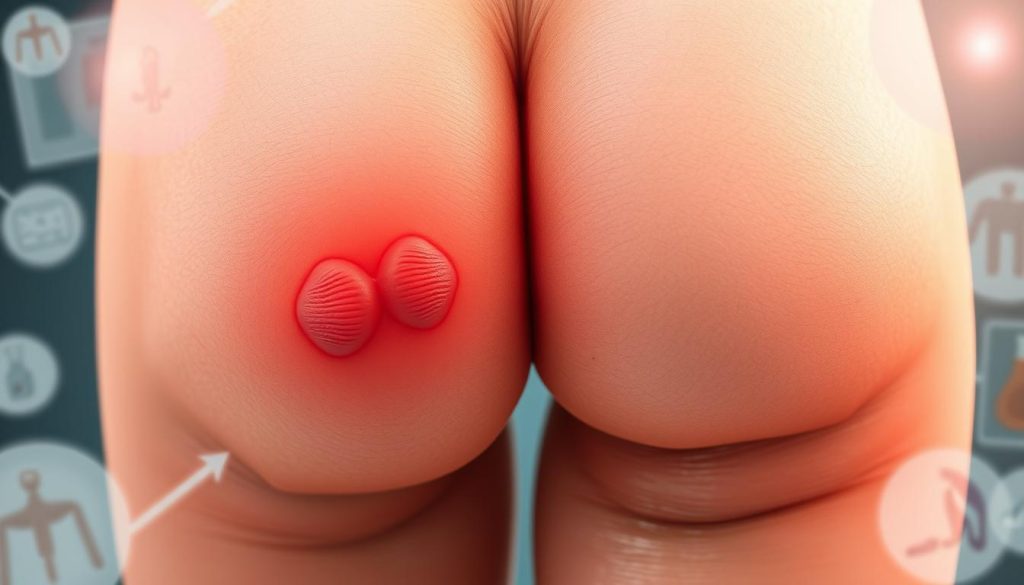
Regular self-checks are key if you think you might have hemorrhoids. Look for redness, swelling, and any bulges. These are usually easy to spot. Bleeding is another sign, though it might not always be obvious. If you see blood on your toilet paper or in the bowl, tell your doctor.
| Visual Indicator | Associated Symptom | Potential Condition |
|---|---|---|
| Swelling | Discomfort or pain during bowel movements | Possible external hemorrhoids |
| Redness | Irritation or itching | Indicative of inflammation or infection |
| Protrusions | Pain and visible lumps | Likely internal hemorrhoids protruding outward |
| Bleeding | Blood on toilet paper or stool | Internal hemorrhoids likely, but requires confirmation |
Spotting these signs of hemorrhoids is the first step to managing symptoms. Knowing what to look for helps in early detection. It also helps when talking to doctors about treatment. Accurate descriptions of hemorrhoid symptoms are crucial for a proper diagnosis and relief.
Emotional Impact of Hemorrhoid Discomfort
Living with hemorrhoids is more than just dealing with physical pain. It also affects your mental health and emotional well-being. The constant discomfort can lead to various psychological responses, making everyday life tough.
Psychological Effects of Chronic Discomfort
Hemorrhoids can cause stress, anxiety, and even depression. The ongoing pain can change your mood and behavior. It can make you more irritable or frustrated, impacting your relationships and work.
Here’s a look at common emotional reactions to long-term hemorrhoid discomfort:
| Emotional Response | Details | Frequency |
|---|---|---|
| Anxiety | Worry over pain or anticipated pain during bowel movements. | Common |
| Embarrassment | Social stigma and discomfort discussing symptoms with others. | Very Common |
| Depression | Persistent discomfort leads to reduced interest in daily activities. | Moderate |
| Social Isolation | Avoiding social interactions due to fear of episodes or need for urgent restroom access. | Less Common |
Knowing you’re not alone can help. Many people face similar discomfort.
Coping Strategies for Emotional Stress
Dealing with the emotional side of hemorrhoids needs practical strategies. Here are some effective ways:
- Seek professional guidance from healthcare providers who understand the nuances of hemorrhoid discomfort.
- Participate in support groups either online or locally – connecting with others facing similar challenges can provide much-needed empathy and advice.
- Practice mindfulness and relaxation techniques such as deep breathing exercises, meditation, or yoga to help manage stress and pain perception.
- Engage in regular physical activity to boost mood and counteract potential weight gain from reduced activity due to pain.
Using these strategies can lessen the emotional burden. It helps manage both physical symptoms and emotional distress caused by hemorrhoids.
Assessing Hemorrhoid Discomfort Level
It’s important to understand the hemorrhoid discomfort level to know how it affects your daily life. This helps find the best way to feel better. Let’s look at how to measure discomfort and when to see a doctor.
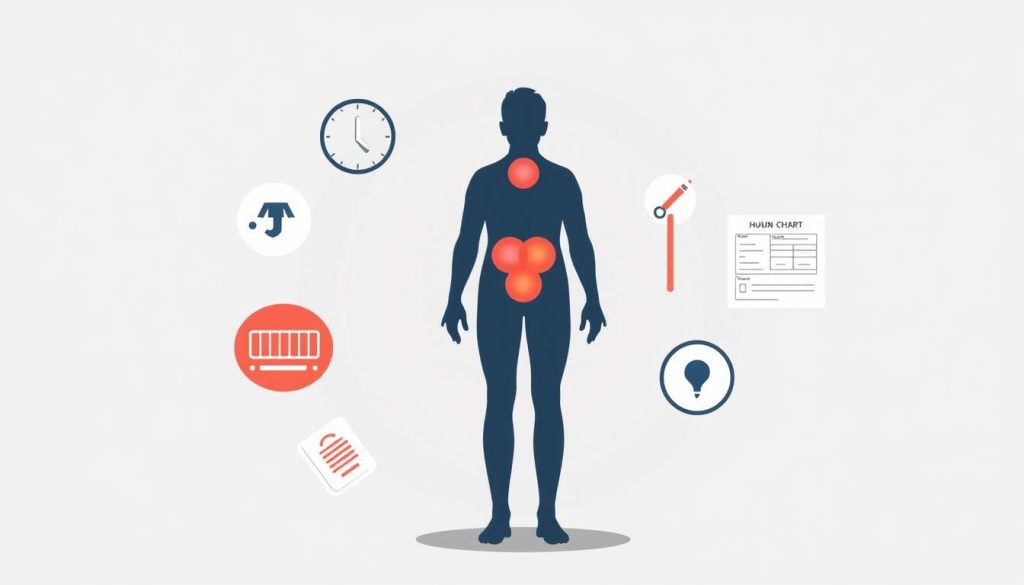
Start by watching how often and how bad the pain is. Hemorrhoid pain can be mild or very severe. It affects not just your body but also your mood.
- Log Frequency and Severity: Writing down your pain each day helps track changes. It shows what works and what doesn’t.
- Notice Changes During Certain Activities: Sitting, standing, or going to the bathroom can make pain worse. Knowing this helps you avoid it.
- Assessment of Physical Symptoms: Pain isn’t the only thing to watch. Swelling, bleeding, or itching also matter a lot. Keep an eye on these signs.
If you’ve figured out your hemorrhoid symptoms and how they affect you, think about seeing a doctor if:
- The pain or other symptoms mess up your daily life.
- Home treatments don’t help in a week.
- There’s a lot of bleeding, really bad pain, or both.
Knowing these signs and how you feel helps you act fast. Whether it’s changing things at home or seeing a doctor, it’s all about getting better. Understanding and managing hemorrhoid discomfort level can improve your life and help you get help when you need it.
Impact on Daily Activities and Lifestyle
The lifestyle impact of hemorrhoids is big, affecting people in many ways. It changes how they do everyday things. For those with hemorrhoids, simple tasks become hard, leading to big changes in their lives.
The hemorrhoid symptomatic experience is different for everyone. But, many face pain when sitting or standing for a long time. This affects their work and fun activities.
Lifestyle Adjustments for Managing Symptoms
To deal with hemorrhoid symptoms, people need to make changes in their daily life. This might include:
- Buying ergonomic chairs to make sitting easier.
- Taking breaks to stand up and move around.
- Eating foods high in fiber to help with bowel movements.
Activity Limitation Due to Hemorrhoids
Being unable to do physical activities is really tough for those with hemorrhoids. They often avoid:
- Intense workouts that make symptoms worse.
- Long trips where they can’t move much.
- Sitting for a long time, like in cars or at movies.
These changes and limits show how much hemorrhoids affect people’s lives. It’s important to find ways to manage and treat them. By understanding and tackling these issues, people can improve their lives.
The Role of Diet in Hemorrhoid Symptoms
Knowing how diet and hemorrhoids are connected is key to managing hemorrhoid symptoms. Some foods can make hemorrhoid flare-ups worse or better.
Eating foods high in fiber, like fruits, veggies, and whole grains, helps. These foods make bowel movements easier, which helps prevent and treat hemorrhoids. On the other hand, not eating enough fiber can make symptoms worse.
Drinking lots of water is also important. It makes stools softer, which helps reduce the pressure during bowel movements.
| Beneficial Foods | Foods to Avoid |
|---|---|
| Whole grains (e.g., oats, brown rice) | Refined grains (e.g., white bread) |
| Leafy greens (e.g., spinach, kale) | Excessive dairy products |
| Fibrous fruits (e.g., apples, bananas) | Processed foods and snacks |
| Plenty of water and natural juices | Alcoholic and caffeinated beverages |
It’s not just about what you eat, but also what you avoid. Avoiding spicy foods, and foods high in fat and sugar is important. These can upset your stomach and make hemorrhoids worse.
Having a balanced diet is crucial for managing diet and hemorrhoids. If diet changes don’t help or if symptoms get worse, see a doctor. Making dietary changes can greatly improve life for those with hemorrhoids.
Medical Diagnosis: Confirming the Presence of Hemorrhoids
Identifying hemorrhoids requires a detailed hemorrhoid diagnosis process. It’s designed to spot the hemorrhoid symptoms a patient has. This step is key to understanding how severe and what type of hemorrhoids you have. It helps doctors choose the right treatment.
Diagnostic Procedures and Examinations
The first step is a thorough physical check. Doctors look for swelling or external hemorrhoids around the anus. They might also use anoscopy or proctosigmoidoscopy to see inside the rectum and anus. This helps spot internal hemorrhoids.
Here’s a closer look at common tests:
| Procedure | Description |
|---|---|
| Anoscopy | A short, tubular instrument called an anoscope is used to inspect the lower portion of the anal canal and rectum. |
| Proctosigmoidoscopy | A longer tube than an anoscope, used to examine the rectum and the lower part of the colon for abnormalities. |
Learn more about these tests at this comprehensive resource.
Understanding Medical Evaluation Outcomes
After the exam, doctors review the findings. They decide if you have hemorrhoids and how bad they are. This info helps choose the best treatment, from diet changes to surgery, based on your symptoms.
Knowing the results of your medical examination for hemorrhoids is crucial. It helps manage and reduce the discomfort from this common condition.
Over-the-Counter Solutions for Hemorrhoid Relief
Many people with hemorrhoids look for quick hemorrhoid relief. Luckily, there are over-the-counter hemorrhoid treatments that can help. These options are easy to use and don’t need a doctor’s prescription.

Here’s a look at some common over-the-counter options that can help a lot:
- Creams and ointments: These reduce swelling and pain.
- Suppositories: They provide relief from inside the rectum.
- Wipes and pads: Soothing ingredients help clean and comfort the area.
- Sitz baths: They can be used with other treatments to ease symptoms.
It’s also key to know how well these treatments work for different symptoms. Below is a table showing some popular products and what they’re for:
| Product Type | Brand | Active Ingredient | Primary Use |
|---|---|---|---|
| Cream | Preparation H | Phenylephrine HCl | Reduces swelling |
| Suppository | Calmol 4 | Zinc oxide | Internal symptoms relief |
| Wipes | Tucks | Witch hazel | Cleansing and soothing |
| Sitz Bath | CVS Health | N/A | General symptom relief |
Choosing the right treatment depends on your symptoms and how bad they are. If your symptoms don’t get better or get worse, see a doctor. But for many, these treatments offer a lot of relief and are a good first step against hemorrhoid pain.
When to Consider Surgical Options for Hemorrhoids
For many, severe hemorrhoid symptoms lead to looking into surgery. These surgeries, especially the minimally invasive kind, can bring lasting relief. They can greatly improve your life quality.
Understanding Minimally Invasive Procedures
Minimally invasive surgeries use small cuts, reducing pain and quickening recovery. They often mean less pain after surgery and shorter hospital stays.
Recovery Expectations and Surgical Aftercare
Recovery times vary with each surgery type. But most can get back to normal in a few days. Full healing takes a few weeks. Good aftercare is key for healing well and avoiding problems.
| Procedure Type | Description | Recovery Time | Notable Benefits |
|---|---|---|---|
| Rubber Band Ligation | This procedure involves placing rubber bands around the hemorrhoid to cut off its blood supply, causing it to wither away. | 1-2 weeks | High success rate, minimal pain |
| Infrared Coagulation | A device is used to apply infrared light to the hemorrhoidal tissue, resulting in scar tissue that cuts off blood flow to the hemorrhoid. | 1-2 weeks | Less invasive, quick procedure |
| Hemorrhoidectomy | The complete surgical removal of excess hemorrhoidal tissue. This is usually reserved for severe cases. | 2-4 weeks | Long-term relief, prevents recurrence |
Knowing about surgical options for hemorrhoids and minimally invasive hemorrhoid surgery helps patients make better choices. They can talk to their healthcare provider about what’s best for them.
Preventative Measures to Avoid Hemorrhoid Flare-Ups
Learning how to prevent hemorrhoids and handle triggers is key to staying healthy. Taking steps early can lower the chance of a hemorrhoid flare-up. Here are some tips on lifestyle and diet changes to avoid hemorrhoids.
Eating enough fiber is crucial in the fight against hemorrhoids. Foods high in fiber like fruits, veggies, whole grains, and legumes keep your digestive system moving. This helps avoid constipation, a common cause of hemorrhoids.
- Drink plenty of fluids
- Limit intake of caffeine and alcohol
- Exercise regularly
- Avoid prolonged sitting
Good hygiene and the right bowel movement techniques are also important for hemorrhoid flare-up prevention. Using unscented, alcohol-free wipes can be less irritating than regular toilet paper.
| Strategy | Description |
|---|---|
| Fiber Intake | Increase daily fiber intake with natural sources or supplements. |
| Fluids | Consume a minimum of eight glasses of water daily. |
| Exercise | Engage in light to moderate physical activity for at least 30 minutes per day. |
| Sitting Habits | Take short breaks and avoid sitting for extended periods. |
If you often deal with these issues, looking into more prevention strategies might help. Check out useful resources to learn about managing similar health problems.
By making these lifestyle changes, you not only prevent hemorrhoid flare-ups but also improve your overall health.
Conclusion
In this article, we’ve looked at hemorrhoid discomfort and signs of hemorrhoids. We stressed the need for awareness and quick action. Knowing the first signs of hemorrhoids is key to managing them well.
Understanding the pain and how it affects daily life is crucial. This knowledge helps people take steps to prevent or lessen symptoms.
We’ve covered dietary changes and medical treatments for hemorrhoids. This information helps those affected make smart health choices. Making lifestyle changes and knowing about treatments and prevention is empowering.
While prevention isn’t perfect, it’s still important. It helps lower the chance of future problems.
In short, you don’t have to live with hemorrhoid pain. By recognizing signs and getting help, you can manage symptoms and improve your life. It’s important to stay alert and take care of your health to avoid bigger issues.
FAQ
Q: What exactly are hemorrhoids and why do they occur?
A: Hemorrhoids are swollen veins in the lower rectum and anus. They happen when there’s too much pressure in these areas. This can be from straining during bowel movements, sitting for a long time, being overweight, pregnancy, or eating too little fiber.
Q: What are the differences between external and internal hemorrhoids?
A: Internal hemorrhoids are inside the rectum and can’t be seen. External hemorrhoids are under the skin around the anus and can be seen and felt. Internal ones usually cause painless bleeding. External ones cause pain and discomfort.
Q: How can someone describe the sensation of having hemorrhoids?
A: People with hemorrhoids might feel itching, burning, discomfort, or pain around the anus. They might also feel fullness or a bulge in the anal area, depending on how bad the hemorrhoids are.
Q: At what point should a person with hemorrhoid symptoms seek medical advice?
A: If symptoms are mild, you might manage them at home. But, see a doctor if symptoms don’t go away, really hurt, or if there’s a lot of bleeding or signs of infection.
Q: What kind of pain intensity is associated with hemorrhoids, and how does it vary?
A: Pain from hemorrhoids can be mild or very severe. It often hurts more during bowel movements or when sitting. Severe pain from thrombosed external hemorrhoids needs quick medical help.
Q: Are there visual signs that might indicate the presence of hemorrhoids?
A: Yes, you might see swelling, redness, and lumps around the anus. For internal hemorrhoids, you might not see them without a doctor’s tool during an exam.
Q: What are the psychological effects of experiencing chronic hemorrhoid discomfort?
A: Chronic discomfort can make you feel embarrassed, anxious, and lower your quality of life. It might make you afraid of bowel movements or avoid social activities.
Q: How do hemorrhoids impact day-to-day activities?
A: Hemorrhoids can make daily activities uncomfortable or painful. This is especially true for sitting for long periods, certain exercises, and regular bodily functions. You might need to change your activities or find treatments to feel better.
Q: How does diet influence hemorrhoid symptoms?
A: Your diet is key in managing hemorrhoid symptoms. Eating a lot of fiber can help prevent constipation and reduce straining. But, spicy or caffeine-rich foods can make symptoms worse.
Q: What kinds of diagnostic procedures are used to confirm hemorrhoids?
A: Doctors might use a visual exam, digital rectal exam, anoscopy, or sigmoidoscopy to diagnose hemorrhoids. These tests help find out if you have hemorrhoids, where they are, and how big they are.
Q: What over-the-counter solutions are available for hemorrhoid relief?
A: You can find creams, ointments, pads, and suppositories over the counter. They contain ingredients like hydrocortisone or witch hazel. They can help with itching and discomfort.
Q: When should someone consider surgical options for hemorrhoids?
A: Surgery might be needed if other treatments don’t work or if hemorrhoids are big, severely prolapsed, or have a clot. A doctor can help decide the best course of action.
Q: What are some preventative measures to avoid hemorrhoid flare-ups?
A: To avoid flare-ups, eat a high-fiber diet, drink plenty of water, exercise regularly, and avoid sitting for too long. Also, practice good bathroom habits and use proper lifting techniques to avoid straining.















